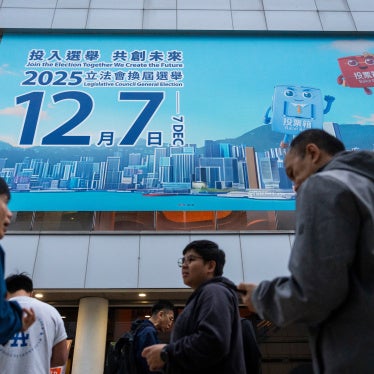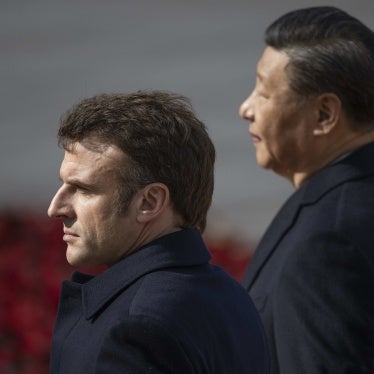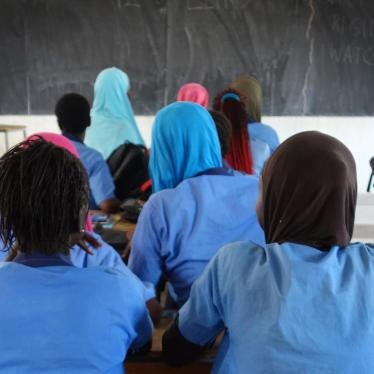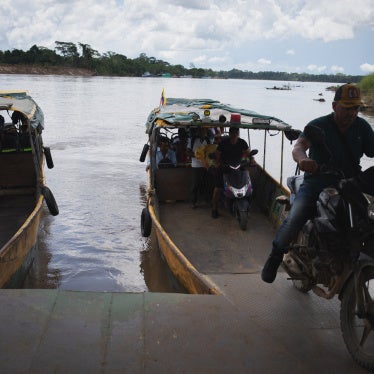Indonesia stood up to be counted recently, joining in a call for accountability for government crimes against the people of Syria. But Indonesia is now faced with another crucial test of its willingness to take international leadership, and the issue is closer to home. What about Sri Lanka?
Later this month, a number of countries will sponsor a resolution at the UN Human Rights Council calling on the Sri Lankan government to take action to ensure justice and promote national reconciliation following the armed conflict between the Sri Lankan government and the separatist Liberation Tigers of Tamil Eelam, which ended in 2009. Indonesia should support it.
The Sri Lankan government has not kept its commitments to the people of Sri Lanka, the UN secretary-general, and the UN Human Rights Council to take credible steps to provide justice and accountability for widespread and serious wartime abuses by all sides. For almost three years, the international community has waited patiently for the government to keep its promise. Sri Lankans who have endured war and abuses for decades without any measure of justice have been waiting much longer.
More than 100,000 civilians, especially in the country’s north and east, are believed to have been killed during the 26-year war. Government forces were implicated in numerous extrajudicial killings, torture, and enforced disappearances. The LTTE committed countless killings and suicide bombings, used child soldiers, and denied basic rights to civilians living in areas under its control. Both sides were responsible for rampant laws of war violations in 2008 and 2009, particularly against the more than 300,000 ethnic Tamil civilians directly affected by the fighting.
The final months of the conflict were particularly brutal. Government forces indiscriminately shelled and bombed areas packed with civilians lacking food, water and health care, whom the LTTE refused to allow to escape. The LTTE effectively used the population as “human shields” and fired upon families who sought to escape the fighting.
When the government failed to keep its promise to UN Secretary-General Ban Ki-moon in May 2009 to investigate allegations of wartime abuses, Ban, in June 2010, established a panel of experts to advise him. The panel was chaired by Indonesia’s former attorney general, Marzuki Darusman.
In April 2011, the panel of experts submitted its report. It found “credible allegations, which if proven, indicate that a wide range of serious violations of international humanitarian law and international human rights law was committed” by both sides of the conflict.
As Darusman and his co-experts recently wrote: “In our report, we found credible evidence that both sides had systematically flouted the laws of war, leading to as many as 40,000 deaths — many multiples more than caused by the strife in Libya or Syria. The bulk of that total was attributable to deliberate, indiscriminate, or disproportionate governmental attacks on civilians, through massive shelling and aerial bombardment, including on clearly marked hospitals.”
However, rather than addressing these allegations and investigating these atrocities, Sri Lankan government officials have personally attacked Darusman and cast aspersions on his credentials to hold this UN post.
For instance, Rajiva Wijesinha, the president’s adviser on reconciliation, has said, “I suppose it is possible that people’s ethics and values change with the years. But it must also be fun to enjoy a wonderful new career, looking into first Benazir Bhutto’s assassination, and then the Sri Lankan problem, for someone whose promising transitions in Indonesian politics had come to an end.”
Now, instead of engaging in constructive dialogue with members of the UN Human Rights Council and welcoming international concern for the welfare of its citizens, the Sri Lankan government has embarked on aggressive diplomatic efforts to stop its resolution.
Sri Lanka’s human rights envoy, Mahinda Samarasinghe, addressing the council on Feb. 27, used the language of abusive regimes the world over, complaining of interference in Sri Lanka’s internal affairs, ignoring the fact that Sri Lanka has long recognized the universality of human rights through the many rights treaties it has ratified.
The Sri Lankan government has resorted to reciting a laundry list of steps it claims to have taken. What it fails to mention is that most of these measures were set up in haste on the eve of the possible resolution and are little more than cosmetic gestures intended only to avoid international action. None addresses accountability for major human rights violations or the alleged role of senior officials.
This is not surprising, as the Sri Lankan government has a long history of failed promises to address human rights abuses. Instead of investigating credible claims, the government has consistently denied them out of hand and questioned the motives of those who make them, whether it be the UN secretary-general, the high commissioner for human rights, governments, the media or nongovernmental organizations. There is little reason to believe that these most recent gestures will be any more meaningful than previous ones.
The Sri Lankan authorities say there is no need for further investigations since the government-appointed Lessons Learnt and Reconciliation Commission cleared troops of deliberately targeting civilians and largely found only abuses by the LTTE. The government’s reaction to the resolution is excessive, to say the least, particularly considering that it merely calls on the government to initiate credible and independent investigations into allegations of war crimes and to provide the Human Rights Council with an action plan on accountability.
Human rights defenders, journalists and others calling for accountability or believed to have links with the international community are accused of being LTTE supporters — a very dangerous accusation in Sri Lanka. Several human rights groups and victims who had planned to travel to Geneva for the Human Rights Council sessions reported canceling their plans out of fear of government reprisals.
Indonesia is a founding member of the Human Rights Council and has actively participated in this important body since its inception in 2006. As Indonesia has noted in its Voluntary Pledges to the Human Rights Council, Indonesia’s 1945 Constitution mandates that its government actively advance international peace and justice, as well as promote and protect human rights. Indonesia’s Foreign Ministry should endorse Darusman and the UN panel of experts report and stand with the victims in their pursuit of justice.
Sri Lanka may not be on the front pages of the world’s newspapers, but the failure to address the atrocities of 2009 would be a black stain on the world’s conscience. Indonesia should show its commitment to the universality of human rights by supporting the council’s resolution on Sri Lanka.
Elaine Pearson is deputy Asia director at Human Rights Watch. Follow her on Twitter @pearsonelaine







